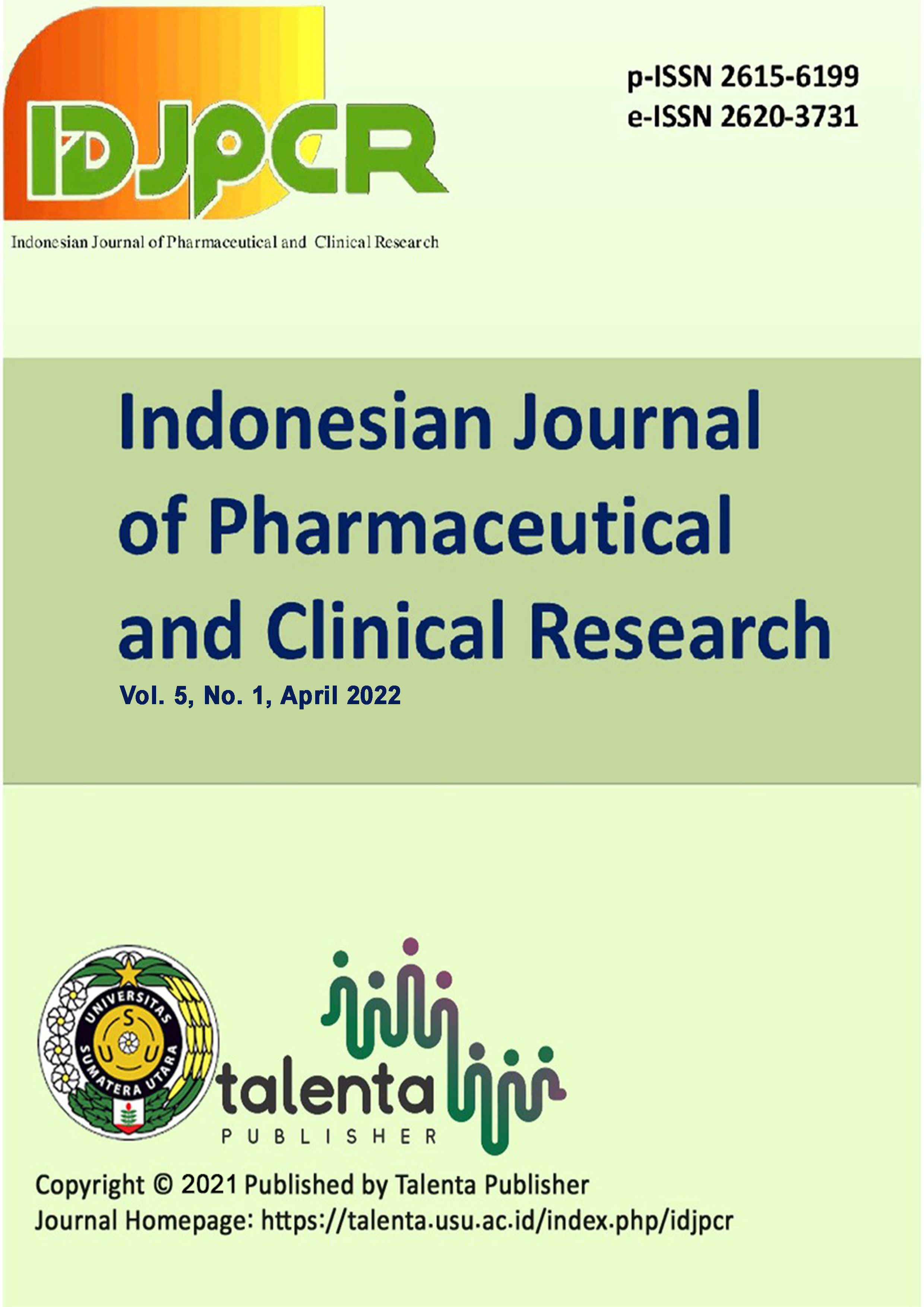The Impact of Pharmacist Intervention on Clinical Outcome, Adherence, and Quality of Life of Patients with Type 2 Diabetes Mellitus
DOI:
https://doi.org/10.32734/idjpcr.v5i1.8708Abstract
Diabetes Mellitus (DM) is a chronic disease that occurs when the body cannot produce enough insulin or cannot use insulin (insulin resistance) and diagnosed by measuring blood glucose level (BGL). BGLs of DM patients should always be controlled to prevent complications. The purpose of this analytical cohort study was to analyze the effect of pharmacy intervention (PI) on BGL, adherence, and quality of life (QOL) of DM Type 2 (T2DM) patients (n=48) admitted to Dr. Tengku Mansyur hospital in Tanjung Balai period December 2020 to May 2021. The BGL, adherence, and QOL of the patients were compared before and after PIs. The patients’ BGLs were recruited from their medical records, their adherence to medication was analyzed using MMAS-8 questionnaire, and the patients QOLs were analyzed using the EQ-5D-3L questionnaire and the scores were categorized into 3 categories (< 0.60 = bad, 0.6 - <0.80 = moderate, ≥0.80 = good). The obtained data were analyzed using descriptive and Wilcoxon Signed-Rank tests in the SPSS Program.
Mean age of the patients was 59.20 ± 8.20 (years). Most (58.3%) of them were females. The mean BGLs (mg/dL) of the patients: before PI 1, 262.02±5.91; before PI 2, 259.39±5.53; after PI, 202.35±4.80; and follow up after PI, 168.60±3.07. The mean adherence scores: before PI 1, 4.833 ± 0.08; before PI 2 4.70±0.07; after PI 6.833±0.09; follow up after PI 7.793±0.05. The mean QOLs of the patients: before PI 1, 0.719±0.005; before PI 2, 0.719±0.001; after PI, 0.801±0.009; follow up after PI 0.977 ± 0.009. There were significant differences among BGLs, patients’ adherence, and their QOLs before and after PI. p=0.000
The present study proved that PI improved medication adherence, BGLs, and QOLs of outpatients with T2DM.
Downloads
References
W. WHO, ‘Global report on diabetes’, World Health Organization, 2016.
F. Haris and L. Y. Kristianti, ‘The Correlation between The Knowledge Level of Diabetes Management toward The Preprandial Glucose Levels’, IJNP (Indonesian Journal of Nursing Practices), vol. 4, no. 1, pp. 21–27, 2020.
R. Esmaeili et al., ‘Calculating the unit cost of student training at Gonabad University of Medical Sciences in 2017: Using a step-down method’, Journal of Medicine and Cultivation, vol. 27, no. ویژنامه, pp. 169–178, 2018.
G. Roglic, ‘WHO Global report on diabetes: A summary’, International Journal of Noncommunicable Diseases, vol. 1, no. 1, p. 3, 2016.
H. Z. Huri and L. C. Ling, ‘Drug-related problems in type 2 diabetes mellitus patients with dyslipidemia’, BMC public health, vol. 13, no. 1, pp. 1–13, 2013.
Y. Ayele, K. Melaku, M. Dechasa, M. B. Ayalew, and B. A. Horsa, ‘Assessment of drug related problems among type 2 diabetes mellitus patients with hypertension in Hiwot Fana Specialized University Hospital, Harar, Eastern Ethiopia’, BMC research notes, vol. 11, no. 1, pp. 1–5, 2018.
C. P. Lira, ‘Potensi Drug Related Problems (DRPs) penggunaan obat antidiabetes pada pasien diabetes melitus tipe 2 di instalasi rawat inap rumah sakit Kalooran Gmim Amurang’, Pharmacon, vol. 6, no. 4, 2017.
H. K. Al-Qazaz, M. A. Hassali, A. A. Shafie, S. A. Sulaiman, S. Sundram, and D. E. Morisky, ‘The eight-item Morisky Medication Adherence Scale MMAS: translation and validation of the Malaysian version’, Diabetes research and clinical practice, vol. 90, no. 2, pp. 216–221, 2010.
J. Ramos-Goñi and O. Rivero-Arias, ‘Eq5d: A command to Calculate Index Values for the EQ-5D Quality-of-life Instrument’, Stata Journal, vol. 11, pp. 120–125, Mar. 2011, doi: 10.1177/1536867X1101100108.
P. E. Indonesia, ‘Pengelolaan dan pencegahan diabetes melitus tipe 2 di Indonesia’, Pb. Perkeni, 2015.
S. Sriram, L. E. Chack, R. Ramasamy, A. Ghasemi, T. K. Ravi, and A. M. Sabzghabaee, ‘Impact of pharmaceutical care on quality of life in patients with type 2 diabetes mellitus’, Journal of research in medical sciences: the official journal of Isfahan University of Medical Sciences, vol. 16, no. Suppl1, p. S412, 2011.
J. Shareef, J. Fernandes, L. Samaga, and M. L. Bhat, ‘Evaluating the effect of pharmacist’s delivered counseling on medication adherence and glycemic control in patients with diabetes mellitus’, J Diabetes Metab, vol. 7, no. 3, p. 100654, 2016.
D. Laxmi, S. Kumala, P. Sarnianto, and A. Tarigan, ‘Pengaruh Edukasi Farmasis terhadap Hasil Terapi dan Kualitas Hidup Pasien Prolanis Diabetes Melitus Tipe 2’, Syntax Literate; Jurnal Ilmiah Indonesia, vol. 6, no. 1, pp. 154–172, 2021.
C. N. Fatiha and F. B. Sabiti, ‘Peningkatan Kepatuhan Minum Obat Melalui Konseling Apoteker pada Pasien Diabetes Mellitus Tipe 2 di Puskesmas Halmahera Kota Semarang’, J Pharm Sci, vol. 1, p. 42, 2021.
A. F. Cardoso, R. Cruz, P. Queirós, L. Santiago, C. F. Ribeiro, and P. Ferreira, ‘Assessment of health-related quality of life using the EQ-5D-3L in individuals with type 2 diabetes mellitus’, J Diabetes Metab Disord Control, vol. 3, no. 2, p. 00064, 2016.
S. Syarifuddin, A. Nasution, and K. Aminah Dalimunthe, ‘Impact of pharmacist intervention on improving the quality of life of patients with type 2 diabetes mellitus’, Open Access Macedonian Journal of Medical Sciences, vol. 7, no. 8, p. 1401, 2019.
D. R. Singla, B. A. Kohrt, L. K. Murray, A. Anand, B. F. Chorpita, and V. Patel, ‘Psychological treatments for the world: lessons from low-and middle-income countries’, Annual review of clinical psychology, vol. 13, pp. 149–181, 2017.
S. Pousinho, M. Morgado, A. Falcão, and G. Alves, ‘Pharmacist Interventions in the Management of Type 2 Diabetes Mellitus: A Systematic Review of Randomized Controlled Trials’, J Manag Care Spec Pharm, vol. 22, no. 5, pp. 493–515, May 2016, doi: 10.18553/jmcp.2016.22.5.493.
Downloads
Published
How to Cite
Issue
Section
License
Copyright (c) 2022 Indonesian Journal of Pharmaceutical and Clinical Research

This work is licensed under a Creative Commons Attribution-ShareAlike 4.0 International License.
The Authors submitting a manuscript do so on the understanding that if accepted for publication, copyright of the article shall be assigned to Indonesian Journal of Pharmaceutical and Clinical Research (IDJPCR) and Faculty of Pharmacy as well as TALENTA Publisher Universitas Sumatera Utara as publisher of the journal.
Copyright encompasses exclusive rights to reproduce and deliver the article in all form and media. The reproduction of any part of this journal, its storage in databases and its transmission by any form or media, will be allowed only with a written permission from Indonesian Journal of Pharmaceutical and Clinical Research (IDJPCR).
The Copyright Transfer Form can be downloaded here.
The copyright form should be signed originally and sent to the Editorial Office in the form of original mail or scanned document.









